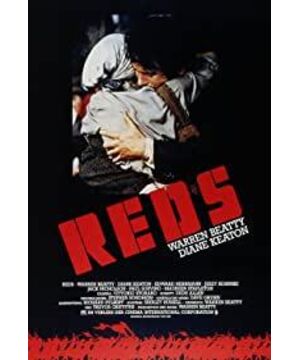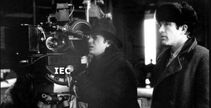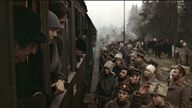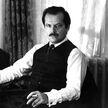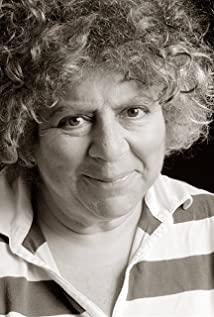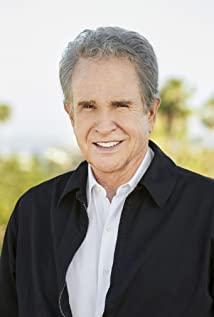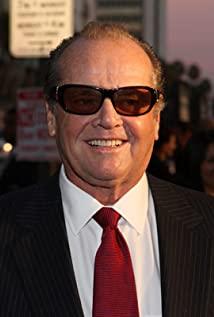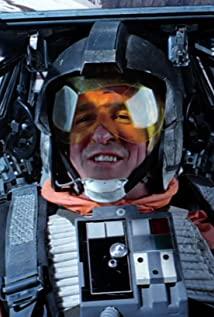http://qfmeng.blogbus.com/logs/189927028.html
Reds (1981)
After reading the IMDB250 and AFI100 series, it is time to watch the Oscar series . Let's take a look at this little-known Oscar best director work, and the winner is Warren Beatty.
The film tells the story of American journalist John Reed's pursuit of an ideal life. In Portland, the actor John Reed met a beautiful married man, Louise Bryan, and the two had a relationship. John Reed asked Louise Bryan to follow him to New York, and after a while, Louise Bryan came to New York to live with John Reed. During this period, John Reed's involvement in various political activities kept him away, much to the anger of Louise Bryan. Louise Bryan on Eugene O' during John Reed's departure Neill has an affair. After John Reed came back, he found out that the two of them were having an affair, so he proposed to get married, and Louise Bryan agreed happily. John Reed and Louise Bryan left New York to live together. Subsequently, John Reed continued to be involved in politics, and Louise Bryan continued to be angry with him. Unbearable, Louise Bryan left John Reed and came to Paris. In 1917, a revolution broke out in Russia, and John Reed found Louise Bryan and wanted to take her to Russia. In this way, the two lived in Russia and experienced the October Revolution personally during this period. After the two returned to the United States, John Reed wrote "Ten Days That Shaked the World," and Louise Bryan spoke about his experiences in Russia. At the same time, John Reed joined the party and planned to go to the Soviet Union to get the party recognized by the Comintern. Louise Bryan still didn't want John Reed to go, but John Reed went anyway. John Reed traveled a long way to the besieged Soviet Union, but his purpose was not achieved. On his way out, John Reed was found locked up by the Finns. When Louise Bryan heard the news, she sought help everywhere, and had no choice but to go to the Soviet Union by herself. John Reed was released after being held for a period of time. Subsequently, John Reed joined the Comintern and preached the revolution everywhere under the leadership of the Soviets. In hindsight, John Reed learned that his speech had been doctored and not delivered as he intended. Meanwhile, Louise Bryan met John Reed's friend in the Soviet Union, and she learned of John Reed's whereabouts. In the end, John Reed and Louise Bryan finally met in the Soviet Union, but John Reed died in the hospital a few days later.
Since this film won the Oscar for Best Director, my focus is also on this. However, from my experience, the narrative method and structure of this film are not unique. The way of narration is flat and straightforward, with no flashbacks or interludes. The rhythm of the film is also very traditional, and it tells the life of John Reed step by step. The only thing that is slightly special is that the film inserts interviews with some real people, and the film explains the process of the story through the interviews of these people. This setting gives the impression of a documentary. Although this approach is novel, there is neither an introduction to the characters nor a synopsis of the interviews in the film, which makes the film seem very difficult, because there is always a relationship between these interviews and the plot. Doesn't this make it harder to understand movies? In fact, there is no need for this at all, such a narrative method is completely superfluous.
The theme of the film is relatively deep, it tells about the idealist's shattering of ideals in the process of chasing ideals. The "idealists" here simply refer to those people who hold a naive ideal and realize it in complete disregard of reality. These people are different from idealists defined in other categories. The idealist of the film is naturally the male protagonist John Reed, who is bent on seeking rights for workers. When the October Revolution broke out in Russia, he was very excited and believed that his ideal had finally come true. However, when his party was not recognized by the Comintern, when the Soviet Union gradually became centralized, when the Comintern tampered with his speech, John Reed knew that everything had gone sour. John Reed said a very meaningful sentence in the film: Revolution is to allow opposition! Indeed, when objections cannot be voiced, there can be no change, let alone revolution. Therefore, socialism will end in the Soviet Union. In short, the film is quite insightful in terms of politics.
There are also many shortcomings in the film. The film's most obvious shortcoming is that the plot is trivial, and the main storyline is the frequent quarrels between John Reed and Louise Bryan, making the film very boring. From quarreling before marriage to after marriage, from Portland to New York and then to Russia, the two of them quarreled almost all their lives. The intuitive feeling of the film is that Louise Bryan always has a lot of dissatisfaction, dissatisfied with this, dissatisfied with that, and always does not want John Reed to leave. From my point of view, Louise Bryan is a grumpy woman who sticks to John Reed like gummy candy, and follows him wherever he goes. I really don't understand why the film has such a character? Is it to highlight John Reed's determination to stick to his ideals? In addition to this shortcoming, the film also has shortcomings such as the plot is not attractive, the film is too long and so on. In short, this movie is a very ugly movie for ordinary people, and it took me three days to watch this movie and divide it into three times before watching it.
Finally, let's talk about the filming. This film is a historical film, the story takes place in the 1920s, but the film does not feel the characteristics of the times. The most typical is the costumes of the characters. They don't look like the first two decades of the last century at all, but rather look like the 1970s and 1980s. This makes me very puzzled. Is it true that the revolutionary people who engage in socialism have unique clothes and clothes? In addition, the scenes of this film are very small, most of them are indoor scenes, and I rarely see large-scale outdoor scenes. I feel that this film does not have the atmosphere of a historical film. All in all, the film feels like a low-budget movie on the screen, with simple sets, costumes, and props. It is hard to imagine that this is a biopic reflecting the October Revolution.
The performance of the actors in this film is still very good, and several big names are doing their best. The hero played by the hero Warren Beatty gives a firm feeling, a spirit of fighting for ideals, and his handling of emotional dramas is also in place, which makes people very convinced of the hero he created. Diane Keaton, the heroine, is equally good. She is very eye-catching in several quarrels with the male lead, and she is very imposing, especially her eyes. This movie changed my feelings about Diane Keaton a lot. The role played by Jack Nicholson doesn't appear much, but the elegant and charming appearance is really flattering, and it's no accident that the heroine likes her. Jack Nicholson really is an acting school. Gene Hackman ran a trick in the film, but it was still eye-catching and impressive. Others don't say it, they are all tricks.
in conclusion. This is a very unattractive biopic with a length of 194 minutes. There are no major shortcomings, but there are no obvious shortcomings. It is a film work that is not successful. However, the film deserves an Oscar for Best Director because it's too mediocre overall. Of course, as a capitalist country, it is surprising that a film that reflects the communist revolution can be made and won an Oscar, and Warren Beatty is also very courageous.
Sequence: 0706
Reds.1981.BluRay.720p.AC3.x264-CHD
2012-02-01
View more about Reds reviews


